Defending Religious Freedom to Make the World a Better Place
Tai Ji Men Case Discussed at the IRF Summit 2022
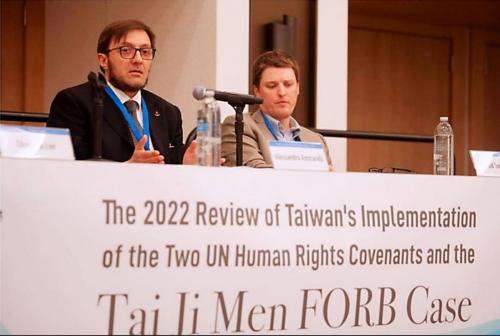
Dr. Alessandro Amicarelli, president of European Federation for Freedom of Belief, left, discussed the unjust Tai Ji Men case with fellow speaker Dr. Donald Westbrook, at a breakout session of the IRF Summit 2022.
The International Religious Freedom (IRF) Summit 2022 took place on June 28-30 in Washington, D,C., with former U.S. Ambassador-at-Large for International Religious Freedom Sam Brownback and Dr. Katrina Lantos Swett, president of the Lantos Foundation for Human Rights and Justice, as co-chairs. The event brought together global religious and political leaders as well as academics, including Guatemalan President Alejandro Giammattei; US Secretary of State Antony Blinken; Prof. Mary Ann Glendon, learned hand professor of law, emeritus Harvard Law School; as well as religious freedom advocates and persecuted religious groups or individuals. Approximately 1,000 people attended the conference, which aims to promote religious freedom and human rights protection around the world.
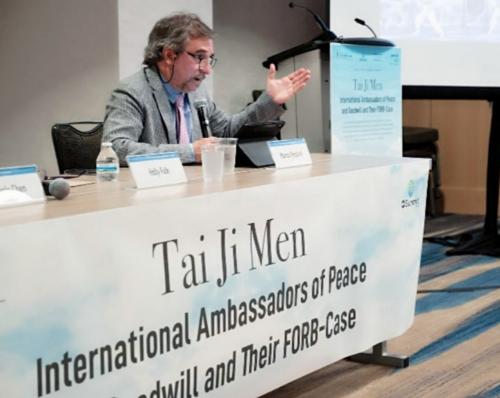
Marco Respinti, director in charge of Bitter Winter magazine, advocates for an immediate redress of the unjust Tai Ji Men case in Taiwan at another breakout session of the IRF Summit 2022 in Washington.
Its first plenary session opened on the morning of June 29 under the theme of “Why IRF Matters in the Modern World.” As Co-Chairs of the Summit, Ambassador Brownback and Dr. Swett welcomed all participants and highlighted the importance of defending religious liberty for all.
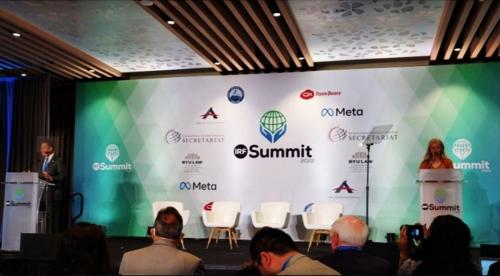
The first plenary session of the IRF Summit 2020 opened on the morning of June 29 under the theme of “Why IRF Matters in the Modern World.” As Co-Chairs of the Summit, Amb. Brownback and Dr. Swett welcomed all participants.
“Religious freedom for everyone, everywhere, all the time. That’s what we are about. That’s what we are pursuing.” Ambassador Brownback reiterated the motto of the summit, lamenting, “Unfortunately, that motto is not the reality in the world today. Unfortunately, it’s not even close.” “The most abused human right in the world today is religious persecution,” he added. According to a joint statement issued by Ambassador Brownback and Dr. Swett, nearly 80% of the world’s population lives in countries with significant restrictions on what they can believe and how they can worship. He encouraged everyone to fight for the defenseless, speak for the voiceless, and respect all religions everywhere. “This is the friendship summit,” emphasized Amb. Brownback, urging people to come together across various faiths and traditions and start working together to make the motto a reality.
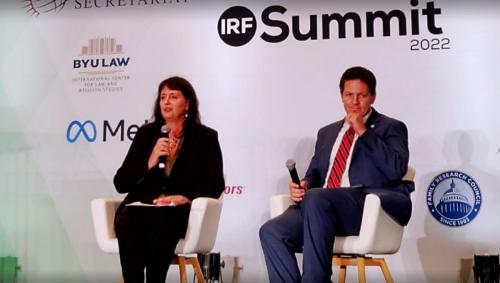
Nadine Maenza, former chair of the United States Commission on International Religious Freedom (USCIRF), left, talked about issues of religious freedom in Syria.
“IRF (International Religious Freedom) matters in the world also because it is intimately implicated in our own national security, and in the national security and wellbeing of societies around the world. We know that countries that do a good job robustly protecting freedom of religion, conscience, and belief are more peaceful, are more prosperous. They provide more opportunity for their citizens, and they do not threaten other countries. Sadly, the converse is also true.” She stated that nations that persecute people of faith and suppress religious freedom also suppress other fundamental human rights; thus, it is not just about defending those who have been persecuted for their faiths, as important as that is; it is also about defending the pillars of strong, democratic, and free societies. People are experiencing unprecedented material wealth, but they are also experiencing unprecedented hunger, and the only way to satisfy that desire is to seek truth for themselves and live their lives with integrity, according to Dr. Swett.
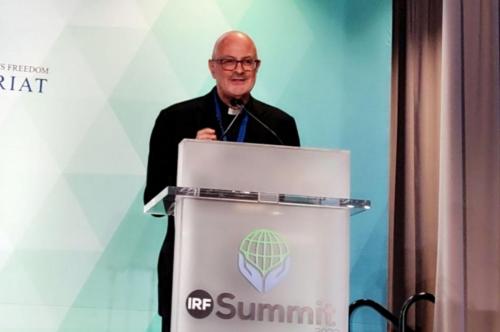
Bishop Mansour stated that the purpose of a government is to guarantee people “the God-given right to pursue their deepest-held convictions, to practice according to their conscience of faith privately and publicly without fear.”
Other influential leaders, such as Guatemalan President Alejandro Giammattei; U.S. Secretary of State Antony Blinken; and Prof. Mary Ann Glendon, learned hand professor of law, emeritus Harvard Law School, also shared their thoughts about religious liberty. Secretary Blinken also stressed the importance of defending religious freedom, expressed his gratitude for organizations that monitor violations of religious freedom, and invited civil society organizations across faiths and beliefs to continue partnering with the United States and with each other to defend freedom of religion so that all nations and communities will be better off.
During the second plenary session on the theme "Global IRF Snapshot in 2022," more leaders, as well as organizations and individuals suffering from religious persecution, shared their experiences. Nadine Maenza, former chair of the United States Commission on International Religious Freedom (USCIRF), talked about issues of religious freedom in Syria.
Bishop Mansour stated, “The stories that we hear are heart-wrenching, but the courage that we see is beautiful. To believe in religious liberty is to find joy in advocating alongside other religious leaders to promote the primacy of conscience, equal citizenship, and the abiding truth that governments are responsible to people, not the other way around. Governments are not an end in themselves, but a means to an end. And that end is to guarantee all citizens the God-given right to pursue their deepest-held convictions, to practice according to their conscience of faith privately and publicly without fear.”
Among the persecuted organizations is Tai Ji Men Qigong Academy, and its unjust case was discussed in two breakout sessions of the IRF Summit on June 30. The theme of the first one was "The 2022 Review of Taiwan's Implementation of the Two UN Human Rights Covenants and the Tai Ji Men FORB Case.” Internationally renowned scholars and human rights activists, such as London-based Dr. Alessandro Amicarelli, president of European Federation for Freedom of Belief; Dr. Donald Westbrook, a lecturer for the Library & Information Science Department at San Jose State University, USA; Charlotte Lee, an attorney in Taiwan, and others shared their insights on the violations of the ICCPR and ICESCR in the Tai Ji Men case. They also discussed the implications of the case on the international community.
The theme of the second was "Tai Ji Men: International Ambassadors of Peace and Goodwill and Their FORB-Case," which was discussed from different perspectives by Marco Respinti, director in charge of the world famous magazine Bitter Winter; Dr. Holly Folk, professor of humanities and social sciences at Western Washington University, and other human rights activists.
The Tai Ji Men case in Taiwan is actually quite simple. While the prosecutors in the Kaohsiung and Hsinchu had declared that no illegal act was found in the practices of Tai Ji Men and that they had closed the case or were about to close the case after receiving anonymous and ill-founded reports against Tai Ji Men. An unscrupulous prosecutor in Taipei, however, induced a tax collector Shih Yueh-sheng to commit purgy, falsely claiming that Tai Ji Men evaded taxes.
While Taiwan’s Supreme Court in 2007 declared Tai Ji Men not guilty of tax evasion or any other charges, the National Taxation Bureau ignored the Supreme Court’s decision and issued illegal tax bills to Tai Ji Men. In 2020, Tai Ji Men’s sacred land was unlawfully auctioned and then confiscated based on the ill-founded tax bill.
To uncover the lies, reveal the truth, and uphold justice, conscience, religious freedom, and human rights, Tai Ji Men has been courageously fighting against the injustice vested on them for over 25 years and seeking international support to exert pressure on the Taiwanese government to stop using taxation as a weapon against religious and spiritual groups and protect religious freedom–the pillars of a democratic and free society–to realize the motto “religious freedom for everyone, everywhere, all the time” so that all nations and the world will be better off!
- 412 reads
Human Rights
Fostering a More Humane World: The 28th Eurasian Economic Summi

Conscience, Hope, and Action: Keys to Global Peace and Sustainability

Ringing FOWPAL’s Peace Bell for the World:Nobel Peace Prize Laureates’ Visions and Actions

Protecting the World’s Cultural Diversity for a Sustainable Future

Puppet Show I International Friendship Day 2020

